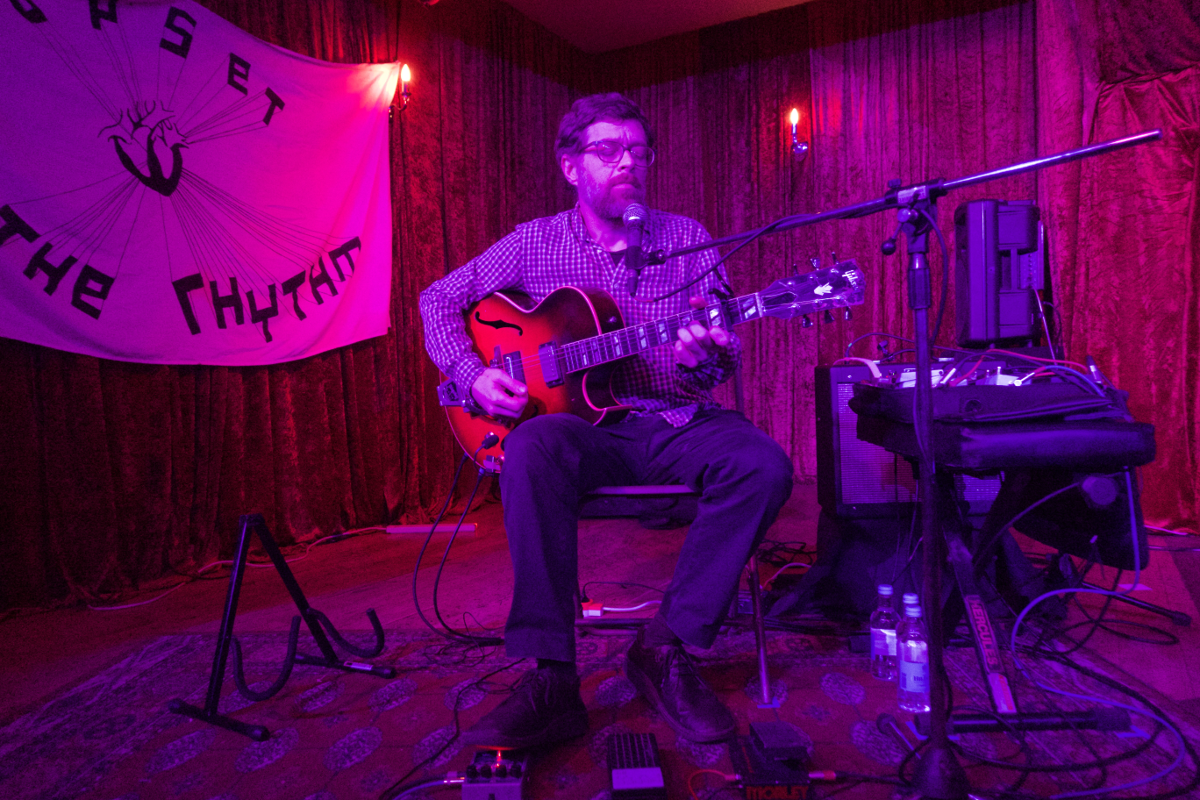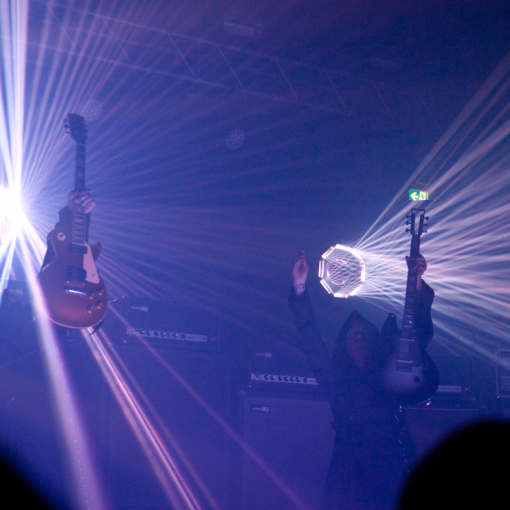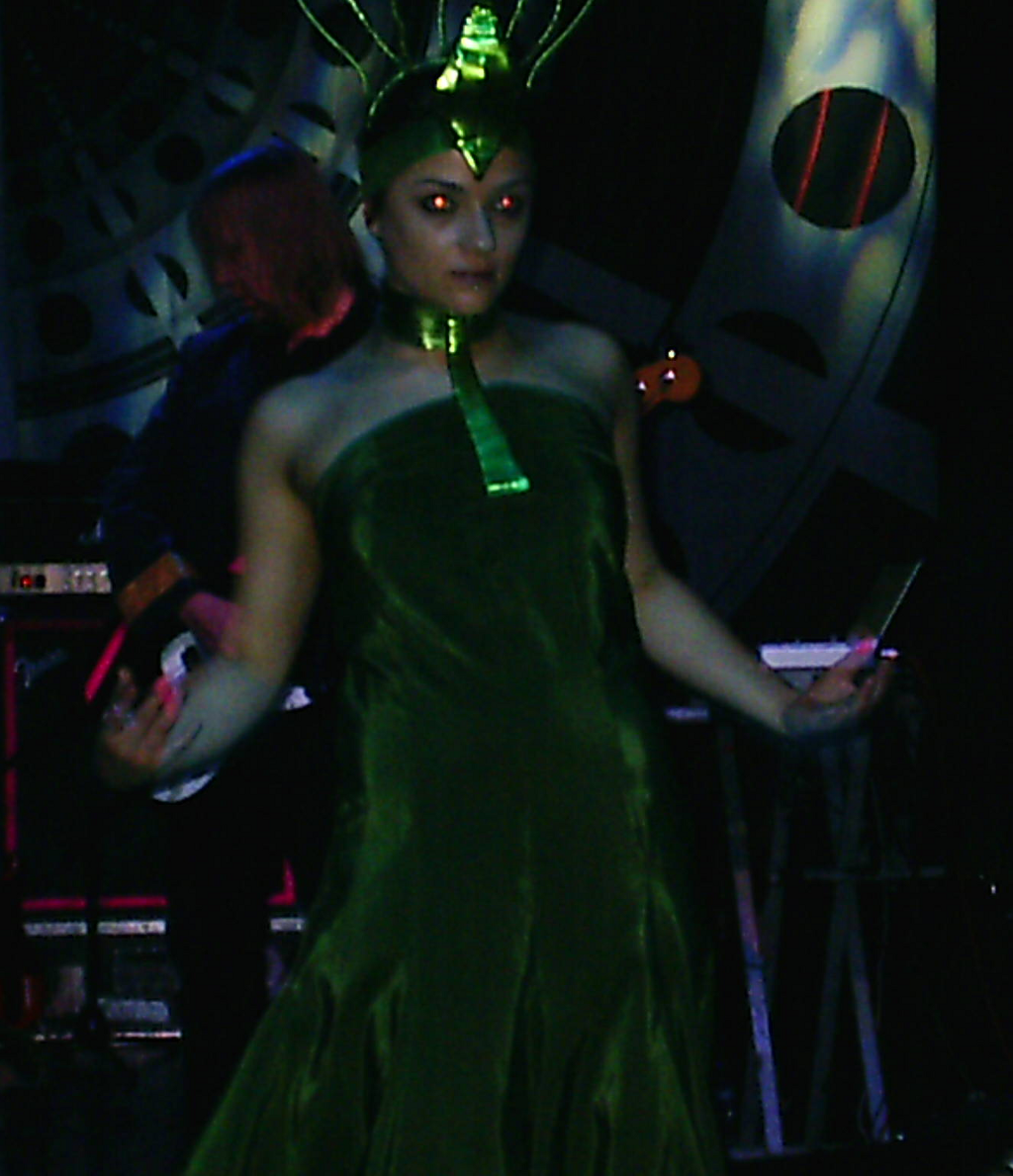Meltdown
Queen Elizabeth Hall, London
19 June 2011
“Please take your seats in the auditorium, as this evening’s performance is about to begin.” Sent scurrying into the Queen Elizabeth Hall by Sir Ian McKellen’s stentorian tones, we bury ourselves deep into the QEH’s welcoming black leather seats just as the lights goes down. I bolt down half a glass of the overpriced pseudo-Coke sold to me minutes earlier, and instantly regret it.
The lights dim, and the tableau remains lit by only six small lights – five blue and one orange – as dry ice swirls around moodily in eerie little clouds. Out onto the stage strides Reinier van Houdt, a curious and beguiling mixture of diffident and confident. Pale, thin (picture Christian Bale in The Machinist without the Method humour by-pass) and barefoot, the Dutch pianist sits down at the black Steinway Grand and greets us with a disarming “Hi everyone.” Van Houdt, renowned for both his virtuoso technique and somewhat off-beat classical repertoire, tells us that tonight he will introduce us to some neglected Titans of British music. Tell us more we say. Though quietly so as not risk the ire of Sir Ian McKellen, whom we are all sure must be watching our every move from the gallery…Van Houdt begins with a performance of a piece by the first Titan, Kaihosru Shapurji Sorabji, whom one might be forgiven for not immediately recognising as being, like Norman Tebbit, a son of Chingford. Born in 1892, Sorabji’s piano compositions are legendary in the classical canon for their mind-boggling complexity and, in some cases, enormous duration: Opus Clavicembalisticum, clocking in at a hefty four hours, was, for many years, regarded as the longest piano piece ever written. This was contradicted by Sorabji himself, who claimed he had other pieces that were much longer. Van Houdt, however, is made of stern stuff, and has performed pieces by Sorabji in a number of festival and radio performances. Van Houdt tells us that Sorabji was a kind of composer savant, able to play anything by ear, the way some can memorise telephone directories after a single glance, and that, according to the composer, this is “music, but it smells a bit funny.” And so van Houdt begins, surfing Sorabji’s epic, volcanic score from peak to trough, moving from Keith Jarrett to Rachmaninoff and back again in a dizzying display of skill. From furious passages of speed, full of flurries of notes almost too complex to decipher, to strange, tense and dramatic pauses whilst he breaks off mid-dazzle in order to turn the pages of the score, van Houdt is demonstrating everything he has to give on the instrument to which he’s very obviously given his entire life. And it’s a joy to hear.
The second British Titan to step out from the shadows is Cornelius Cardew, sadly not a household name for the most part, but nevertheless a hugely influential figure in bringing modern avant-garde techniques into British music, working as assistant to Stockhausen, publicising the works of John Cage, LaMonte Young and Morton Feldman, and even serving a stint in an early configuration of AMM. Cardew was killed in a hit and run incident in 1981 – some allege by MI5, as a pre-emptive strike against his left-wing agitation – robbing the country of a true original. Van Houdt begins its “sad, dusty waltz,” before the piece swells and surges around a single fluttering chord, van Houdt rippling the notes in a torrent of sound which brings to mind Evan Parker in full-on circular breathing mode. Despite its model being a single chord, the music seems, at times, almost too musical for the human ear to comprehend, a kind of atomic fission of the chord, breaking down into its constituent parts in a huge release of energy and sound before drifting away quietly to a gentle, delicate coda.After such an astounding display of skill and commitment, Van Houdt takes a very modest and brief round of applause before sauntering off. The fact that his mission is to (re)introduce such important and oft-neglected work back into the musical body politic cannot be praised highly enough. Take that Christian Bale.
During the intermission we are serenaded by both Bing Crosby singing us “Don’t Fence Me In” (“I can look at hovels and I can’t stand fences…”) and Paul Rich’s velvet smooth rendering of “Cruising Down The River,” which can’t help but bring to mind Philip Marlow bandaged up in bed and sinister scarecrows up to no good in the Forest of Dean. And I won’t even mention the Nurse Mills skin cream scene.
My reveries of Joanne Whalley are rudely brought to end when Andrew Liles, electronic effects wizard, takes the stage quietly and then proceeds to assault our ears with Boney M’s “By The Rivers of Babylon” at skull-crushing volume. Ladies and gentlemen, Current 93 have begun. Gradually the sickly sweet strains of Boney M begin to phase and distort, crackling and disintegrating at massive volume, and for a moment I share Joe Simpson’s feeling during his struggle to stay alive in the Andes, “Bloody Hell, I’m going to die to Boney M.” Thankfully there’s no void to be touched for me today, and the rest of the band appear to take their places, master guitarist James Blackshaw, oud player Eliot Bates, drummer Alex Nielson and the incomparable Baby Dee on piano. Finally, out comes Mr Tibet, resplendent in white suit and black beret.With Blackshaw starting up a riff of pure Baroque Beefheart, a large projected backdrop begins to depict a black disc patterned with a smattering of strange, glowing, white spermatozoids. As the band’s howling banshee sounds whistle through the auditorium, the spermatozoids gradually proliferate, eventually being joined by crucifixes of varying sizes until the whole design begins to resemble some odd hybrid of Mappa Mundi meets Méliès moon. Beneath the eerie crosses, it flashed across my mind that if this music had been belting out of a massive PA as the army of King Guy marched out to meet Saladin at the Battle of Hattin, then they would surely have swept all before them, water or no water. Scary.
Scarcely shy of thirty years since the band’s first recordings, it is admirable that Current 93’s sound manages the not inconsiderable feat of both remaining true to the musical style, genres and influences that characterised those earliest releases, whilst also have evolved and changed in the interim. The band’s current sound, that of the “dark emerald seducer,” takes a template that one could almost imagine as epic pop, yet reflects it into a dark and distorting mirror, until something that might almost find its way into an Elbow setlist, becomes infected by the DNA of Comus, and instead ends up as an exemplar of the left-hand path English esoteric.
On “Honeysuckle,” from the new album Honeysuckle Æons, a slightly Balkan and Eastern European influence creeps into the intro, the song rising and falling into a huge finale of exhalation, the backdrop vanishing on the last note. On several occasions Tibet makes mention of the recent bereavements and tragedies that have underpinned the writing of much of the band’s recent material – from the break-up of his marriage to the death of his close friend Sebastian Horsley – and, given such prompting, one cannot help but see a huge measure of personal catharsis in many of the newer songs. However hard for Tibet personally, it’s us, the audience, that benefits from his pain and longing, translated as they are here into huge sweeps of sound that move from the most delicate piano to Godspeed!-style waves of sound to Calexico desert guitar. On “Black Ships Ate The Sky,” the squalling electronics and heaving riffing even summon up the ghost of Hawkwind, like John Dee after having taken some cheap acid. At its height, this is the music of God’s footsteps moving across the landscape, mixing the violent and the devotional in the same way that Michael Gira managed with Swans at their awesome peak, and sitting in the dark, one can feel a tentacle of Cthulhu, the green, sticky spawn of the stars, coiling around one’s neck.Almost a year to the day since Horsley’s death, Tibet gives an emotional eulogy to his friend, obviously moved close to tears, and introduces the song “Sebastian” with the singular lament, “not many men have sex with 1,000 prostitutes, have themselves crucified and have suits made with tiny pockets for syringes,” and the performance is as fitting an in memoriam as Horsley could have wished for. The evening’s penultimate song is “Not Because The Fox Barks,” the harsh guitar stabs of the intro ring out into the dark hall, puncturing the silence in staccato bursts, as Aleph broods and the Gnostic Fox sets up his throne, and a wash of piano hangs in the air like striations of smoke. The finale sees the band leave the stage one by one, until all that is left is the sound of Baby Dee’s piano and Tibet himself, visibly touched by the warmth of the audience’s applause and cheering, eventually departing with a slightly melancholic wave.
Current 93 leave not with a bang, but with a whisper, and the show is all the more effective for it, feeling as though we have been lifted up, and then taken gently back down, in carefully planned and beautifully plotted musical arc. When the lights come up, it is time to leave the temple quietly, musically fulfilled and spiritually nourished. Nothing is left unsaid and nothing is left to be done.
-David Solomons-



